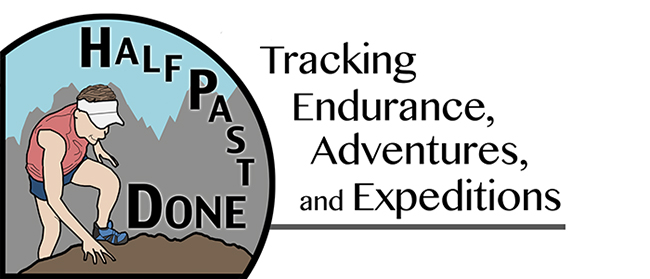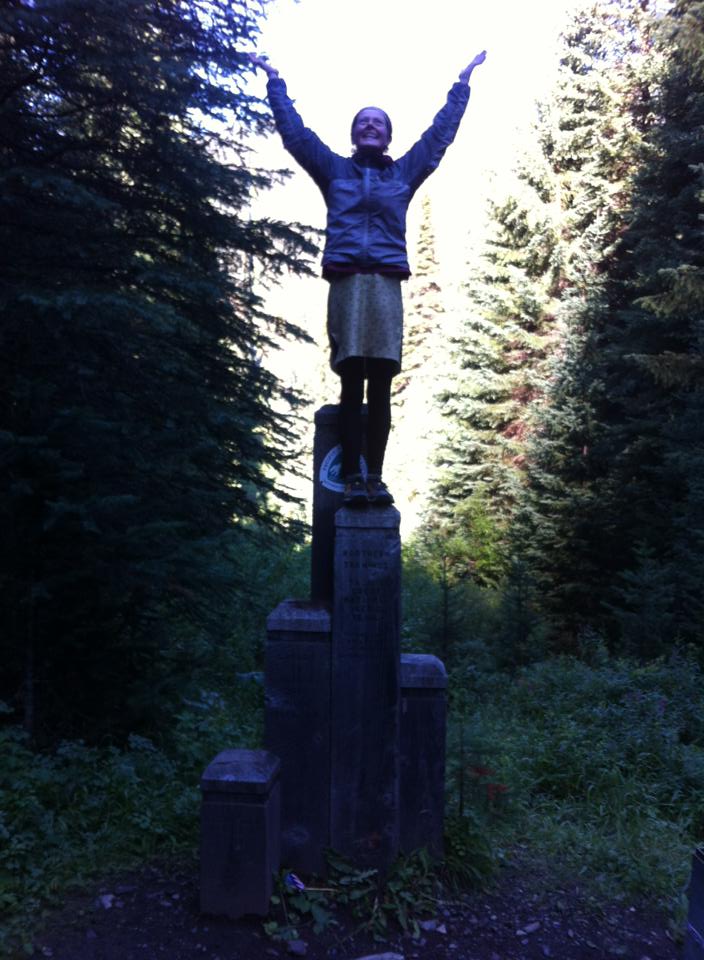One might call 2013 the renaissance for Fastest Known Times, as speed records for popular long-distance hiking trails fall across the United States. Records on the Pacific Crest Trail, the Appalachian Trail, and the John Muir Trail have all been reset in the past two weeks.
Heather “Anish” Anderson, a trail runner from Bellingham, Washington, completed her 2,655-mile journey from Mexico to Canada on the Pacific Crest Trail in 60 days, 17 hours, and 12 minutes. This stood as the overall PCT record until a day later, when Josh Garrett, a 30-year-old fitness instructor from Santa Monica, finished his hike in 59 days, 8 hours, and 59 minutes. Garrett’s journey was “supported,” meaning he had a friend bring him food and supplies at road crossings along the way, while Anderson completed her hike in “thru-hiker style,” meaning she hiked into towns to purchase food or pick it up from post offices. Heather estimated she hiked more than thirty extra miles as a result, and also had to carry more food and gear between farther-spaced resupply points. Both bested the previous overall record of 64 days, 11 hours, and 19 minutes, set by Scott Williamson in 2011.
Because of distinctions accepted by those who track fastest known times, Anderson now holds the women’s as well as the “self-supported” record for the PCT, while Garrett holds the overall and “supported” record for the PCT. Another self-supported record fell when Matt Kirk, a 32-year-old teacher, hiked the 2,185-mile Appalachian Trail in 58 days, 9 hours, and 40 minutes in thru-hiker style. The previous record of 60.5 days, held by Ward Leonard, was more than twenty years old. Jenn Pharr Davis still holds the overall supported AT record of 46 days, 11 hours, and 20 minutes, which she set in 2011.
Also earlier this month, North Face-sponsored runners Hal Koerner of Ashland, Oregon, and Mike Wolfe of Missoula, Montana, teamed up to set a new supported Fastest Known Time for the John Muir Trail, a 223-mile route through the High Sierras from Whitney Portal to Yosemite, California — 3 days, 12 hours, and 41 minutes, besting Brett Muane’s time of 3 days, 14 hours, and 13 minutes, which he set in 2009. Muane still holds the “unsupported” record — meaning he started with all of his food and supplies and gathered only water along the way.
What does it mean to hold a “self-supported” or “supported” record? According to the Fastest Known Time Proboards — widely accepted as the official record-keeper of such things — “The PCT is usually done in typical thru-hiker style, which we would classify as ‘self-supported’ — rather than having a dedicated support crew, the hiker may use mail drops, facilities in towns along the way, and the kindness of strangers. Technically, any pre-arranged support such as friends meeting you along the trail with supplies would be considered ‘supported.'”
Anderson tried to clarify the two distinct records herself in a Facebook posting: “I hold the overall ‘unsupported’ record for the PCT, meaning I carried all of my supplies and walked into and out of towns to obtain more (which added about 30 miles to my hike). I had no prearranged support meeting me along the way. Josh holds the overall ‘supported’ record for the PCT (and overall fastest time across categories), meaning he had a dedicated support team who met him along the way with his supplies so he did not have to walk into towns. His support team may have also provided additional assistance, I don’t really know. For all the long distance trails there are separate, parallel records for supported and unsupported since the differences between the two are so significant. It is amazing that both unsupported and supported records for the PCT were smashed this year within hours of one another. I really hope to meet Josh someday and give him hearty congratulations on his epic hike since we never met on trail.”
Of course, supported and self-supported distinctions are far from black-and-white, and immediately after Anderson and Garrett completed their impressive journeys, questions began to crop up. How much support is support? What makes a hike truly self-supported? Ethics set by prior self-supported record-seekers allow for “the kindness of strangers,” or trail magic — but how much kindness is truly magic, and how much is generated by high-profile record attempts and their “fans?” If you accept something meant only for you, is that support? These questions, while often nit-picking and petty, do point to a larger issue as Fastest Known Time efforts become more popular: Should specific lines be drawn, or will the petty debates simply continue ad nauseum? And how exactly does the community go about drawing specific lines when there’s no real governing body to begin with?
I’ve watched these debates and squabbling regarding self-support rules continue for years in the bikepacking community, from disallowing cell phones in the 2007 Great Divide Race to all but banning most trail magic in recent years of self-supported, long-distance mountain bike racing. I bring it up here because I too was an avid fan of Anderson’s incredible record attempt, and have been disappointed to come across squabbling and controversy in the aftermath of her achievement. I also have much respect for Garrett’s hike, but there’s something even more intriguing about the independence and problem-solving of a self-supported effort. Anderson made all of her own decisions and walked all of her own miles (and yes, the bonus miles into towns that Garrett did not have to walk do make a difference, as did Garrett’s close-at-hand help when things started to go wrong.) Accepting a few pieces of pizza from a “trail angel” rarely makes or breaks a hike, and yet the peanut gallery seems to have a strong fixation on such gray-area issues.
Kirk’s achievement is also significant, even though it’s more than 12 days slower than the overall AT record. What do you think of the unsupported versus self-supported versus supported distinctions? Is it possible to even the playing field without burying these efforts in petty “rules?”
Anderson, for her part, seems to have it figured out: “This whole journey was about me meeting personal goals, not really about the record, that was only part of it. I walked. I was challenged. I overcame. I grew. That is what will always matter regardless of times and records.”


Are you certain about your characterizations of Brett Maune’s times? As I understand it, the two times you cite for him are both from a singular unsupported record attempt. I believe the longer time is for his complete trip from Whitney Portal to the end and the shorter time represents the segment from Mt. Whitney’s summit to the end. Can you clarify?
Sean, thanks for the correction. There was conflicting information in media reports after Hal and Mike finished. But the Proboards do distinguish Maune’s record as single unsupported hike in 2009 with a total time of 3 days, 14 hours. I made a change in the article.
That whole Whitney Portal/Whitney summit business is so confusing. It’s not like a helicopter can drop you off on the summit, so why even make the distinction? Ah, well.
Unfortunately, no playing field is ever perfectly level. That’s why most competitions prevent squabbling by institutionalizing rules, and recognizing judges with authority to make subjective calls. But the PCT is not a playing field, it is mostly wilderness.
PCTA has wisely stated they’re not in the judging business. That they’re avid guardians of wilderness is clear in their mission statement and actions. But they also celebrate Josh & Heather’s remarkable accomplishments in this excellent post, while recognizing that unregulated competition will always be “fraught with arguable points”
http://www.pcta.org/2013/pct-speed-record-is-shattered-twice-13750/
I enjoy both competition and wilderness. So I think we’re going to have to live with squabbling, unless we impose things on the wilderness that simply don’t belong there.
AS to the supported/unsupported ‘rules’, I hate to say it but I think that “unsupported” should be just that. NO outside help/food. Sure it’s easy to say nice people invited you to a dinner one night, or gave you a sandwich or something…howver it’s a slippery slope and could very easily be used for evil. Unsupported is just that, plain and simple. you want your hike to be listed as “unsupported” then you are allowed ZERO outside assistance. Keep it simple, get rid of gray areas. ZERO. Otherwise it’s like cheating at solitare…”well, they only gave me one meal..it wasn’t that big of deal”. Yes it is…surley if you are vying for a record. Just my cents worth.
I feel people not involved in the actual effort of the hike make too much of these things. They try and steal the happiness that these folks discover thru higher achievements.
If you need a “winner,” just read each of their testimony. It’s clear who truly won, in my opinion.
Thx for the great story!
PCT is a journey, trail magic is part of that journey. What kind of hermit nut rejects peoples generosity in pursuit of a record. Even if random people gave Anderson anything she never planned for it. When in the desert you hope some water is left in a trail stash but she didn’t plan for it. The fact that the Garrett admits and planned support, and Anderson didn’t plan for it makes it fair. If any of you have something negative to say about her maybe you should of been the trail police and followed her all the way up. I have met many thru HIkers they are removed from society so they are removed from the lying. Get over it, and beat it if it really bugs you that much. ps… never met her don’t know her
I agree with David. Thx
Goodness. If MattC’s definition of “supported/unsupported” were followed, no one would ever go for the unsupported record. That kind of cut and dry rulemaking makes sense on short-duration trails – but on something that takes 2 months? To never be able to accept a can of pop from a stranger without dropping into the “supported” category? Seriously? I’m with David on this one.
More importantly: Congrats to Anish, Josh, and Matt! Fantastic